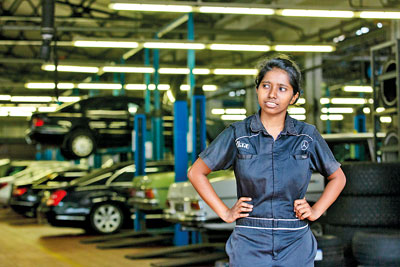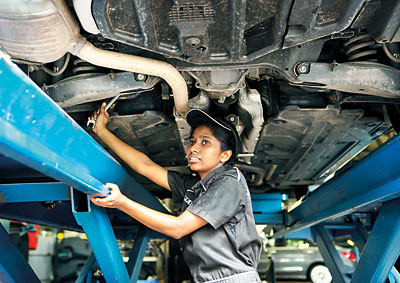Girl in the garage
Standing at just 4’11, Thilini Gunasekera is used to being dismissed. It happened when she wanted to join the Air Force and study aeronautical engineering – she didn’t meet the height requirement. It happened again when she stepped into a classroom full of men to study how to become an automobile mechanic – except this time, Thilini wasn’t going anywhere.

Changing attitudes: Thilini at work. Pix by Sameera Weerasekera
A tyre technician at Diesel & Motor Engineering Plc (DIMO), Thilini is one of only four women working in their automobile service workshops.There are five women with similar qualifications working in their parts and supplies sections and they have another nine female engineers on staff, but for now Thilini’s gender still makes her an outlier on the workshop floor.
Dressed in the black mechanic overalls, with grease on her hands, she is completely herself. There are some 40 bays, each hosting a luxury car in various states of repair. Thilini knows her way around, in part because she has been in and out of garages since she was a little girl. Her father Chandralal Gunasekera had an automobile repair shop adjacent to their home in Kandy, and it was in his company that Thilini, fascinated and more than a little in love, understood how the beautiful engines underneath a hood could power a car.
However, not everyone has been as broadminded as her father about the notion of a female mechanic. Thilini met many who didn’t hesitate to tell her women could not do this work. “They told me, ‘Girls can’t even carry a tyre! They don’t have the strength.’”
 Thilini admits that when she first started out, tyres were hard to carry – but now she hefts them with ease. “A woman is strong enough to be a mother, that means as ladies we have the strength to do this work, too,” she says. Plus, she says the technology today has transformed notions of what her job really looks like. “Technology is at a high stage,” she says, explaining that she works on the Mercedes-Benz line and that a lot of the diagnostic work is now computerized. There are even instruments to help her lift and instal wheels.
Thilini admits that when she first started out, tyres were hard to carry – but now she hefts them with ease. “A woman is strong enough to be a mother, that means as ladies we have the strength to do this work, too,” she says. Plus, she says the technology today has transformed notions of what her job really looks like. “Technology is at a high stage,” she says, explaining that she works on the Mercedes-Benz line and that a lot of the diagnostic work is now computerized. There are even instruments to help her lift and instal wheels.
Thilini still hears the odd criticism, but the loudest voice in her head is always Gunasekera’s. “My father calls me every day, and we talk about what I did at work that day. He is always encouraging. He is my strength,” she says.
And while Thilini’s accomplishments have a lot to do with her own dogged determination, what can’t be ignored is the importance of institutional support. She emphasizes: “We can do this work but we still need people to believe in us, and give us a chance.”
‘If you treat people differently, then you are creating inequality’
In her case, this support has come from DIMO. Women are encouraged to enrol in DATS, the company’s automobile training school. Graduation and a good performance reliably leads to a job offer, says Thilini, pointing out that such opportunities are rarely offered to women in this sector.
Rochelle Vandort, DIMO’s Manager for Talent Development, Diversity and Inclusion, says in a context where there is a perpetual shortage of skilled mechanics, they saw the potential of employing women early on. In 2012 and 2013, they enrolled two batches in DATS made up entirely of women.
Before they began, the company implemented a few key changes: they built the first toilets and changing rooms for women in their workshop in 2011, and have since developed a host of relevant policies including plans to combat sexual harassment and bullying, regardless of gender.
In 2018, they launched the DIMO Women’s Network which provides mentorship and guidance for women in the field, and pledged to work toward a ‘gender smart’ organization. They are the only company in the automobile sector to be part of ‘She Works’ with the International Finance Corporation’s (IFC) Women in Work Programme.
They saw tangible results: just between 2016 and 2018, the number of women in their leadership talent pools grew from 13% to 36%. Rochelle is clear that taking these steps is not about giving women an advantage – it’s about levelling the playing field, so that everyone has the same opportunities and the same access.
“If you treat someone differently, then you are creating inequality,” she says, explaining that their approach has been rooted in valuing competency, ensuring equal pay for equal work, and that the working environment is safe and supportive for everyone.
Preparing for the future
It’s fascinating then to consider that the biggest barrier to women entering the automobile sector might be their own perceptions of what suitable work is, and what they are capable of, says Tharangani Kulasura. Tharangani is a lecturer at DATS and was one of DIMO’s first women trainees. A pioneer in every sense, she helped manage the all-women batches they enrolled and is today a trainer and lecturer teaching the hybrid technology courses at the academy.
“I loved cars from my childhood. I would always be opening them up to look at the engines,” Tharangani says. She applied to DIMO in 2011, and says there was no looking back from that point. “I had never worked in a male-dominated environment before,” says Tharangani explaining that initially she had no idea how to interact with her male peers. Her earliest experiences were on a commercial vehicle site, and she says she was daunted by the size of the components and the vehicles themselves but stepping back was never an option.
She feels that men in the workplace adapt as they get used to having female colleagues. Many have gone out of their way to support her.
Truly, the times are changing. “Women can become independent. We have the opportunities now, we have the same energy as men,” says Tharangani, adding, “but first we have to change our own attitudes, and realise we can do anything.”


